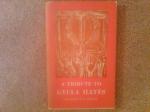|
This section contains 1,285 words (approx. 5 pages at 300 words per page) |

|
SOURCE: "At the Graveside," in The New Hungarian Quarterly, Vol. 24, No. 91, Autumn, 1983, pp. 27-34.
In the following eulogy, Köpeczi describes the ideals, both social and political, that fed Illyés 's work and their lasting effect on Hungary.
Gyula Illyés, the great poet, lived in an age in which the world and Hungary underwent epochal changes which were accompanied with anguish and sacrifice but which had their historic results, too. Illyés faced this age together with its contradictions and its aspirations to build the future. He was active in the working-class movement at the time of the Republic of Councils, he was all his life an advocate of the peasantry and of the entire nation, one who wanted and succeeded not only in writing but in acting in the interests of progress.
In 1939 he wrote that: "Man's business in this world is to be as...
|
This section contains 1,285 words (approx. 5 pages at 300 words per page) |

|


